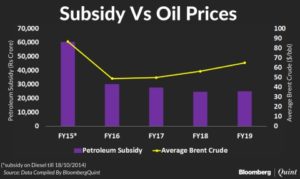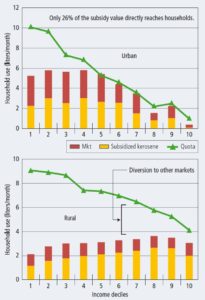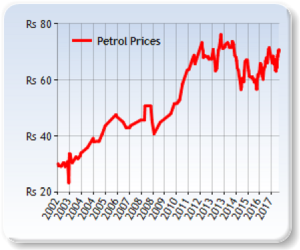
Subsidy removal will build the Oil and Gas Industry and other sectors in Nigeria.
This was made known by the Chairman, Major Marketers Association of Nigeria, MOMAN, and Managing Director of 11Plc, Tunji Oyebanji stated this at the maiden webinar series organized by Association of Energy Correspondents of Nigeria , NAEC, with the theme: “Challenges and Impact of a Deregulated Downstream Sector on Nigeria’s economy”.
“Nigeria Spends N10 trillion on Petroleum subsidy in ten years, this huge amount spent on subsidy will enable Nigeria to build 16 million boreholes, 1 million class rooms, 300,000 fully equipped primary healthcare centres to mention but a few. Apart from the above facilities, Nigeria will save N1 trillion yearly if not spent on subsidy”, he said.
“The Cost of fuel subsidy is affecting Nigeria negatively. This include, increasing number of truck accidents / explosions, degradation of industry infrastructures, lack enough margins generated to maintain, renew and upgrade industry infrastructures”, he added.

The removal according to him will have positive impact such as alignment with the Nigeria National Petroleum Policy, construction and maintenance of refineries, establishing Nigeria as the refining hub for Africa and product availability in the country and for export and increased foreign exchange earnings.
The Chairman maintained that an urgent choice had to be made that resulted in a win-win situation for all stakeholders who are affected or impacted by the decision within the limits of societal values.
“Adopting this change however, has its own set of challenges”, he said.
“This will also lead to the beneficiation of all petroleum products and the increase in ancillary industries, raising the nation’s GDP and increased economic growth”, he stressed.
This will also lead to the beneficiation of all petroleum products and the increase in ancillary industries, raising the nation’s GDP and increased economic growth.

A win-win for the Nigerian consumer, industry stakeholders and the country.
The Chairman however called for caution in managing social issues such as ensuring that the Nigerian populace is carried along so that there is a complete buy-in and less resistance to change, ensuring Nigerians see the benefit of contributing towards the national efforts of implementing a full market driven downstream and managing the reputational building of the downstream sector
He stated that after decades of subsidy a change of mindset is needed – with a focus on economic growth. So also getting the regulations right, cultivate the drive to adhere to industry standards and international best practices.
Oyebanji maintained that self-regulation and self-discipline needs to be in place to achieve the objectives of deregulation, adding that artificial interventions in the market such as subsidy, usually create room for arbitrage, leading to corruption. “So, Nigeria has to make a choice”.
He pointed out that Nigeria’s population has grown to over 200 million people and country revenues have not grown sufficiently to support necessary investments in health, education and country infrastructure to support the population growth as well as pay subsidies for petrol as it has done for decades. “But now the country’s revenues can no longer fund petrol subsidies”, he stressed.

The MOMAN boss however noted challenges which should be addressed such as the debate over price deregulation of the downstream sector in Nigeria is as confusing as it is divisive, proponents on both sides have argued this emotive issue sometimes from idealistic, dogmatic or doctrinaire perspectives (capitalism vs socialism vs communism), or from self-serving interests including business interests (to make more profits) or political interests (expressing populist albeit sometimes impractical views) to gain votes
But he stated that an urgent choice had to be made that resulted in a win-win situation for all stakeholders who are affected or impacted by the decision within the limits of societal values. Adopting this change however, had with it, its own set of challenges.
“The right internal economic policies need to be in place at transition to deregulation: Establishing a legal framework / enabling legislation backing deregulation – Petroleum Industry Bill (PIB)Defining the roles of government and the private sector in achieving full deregulation, taking full advantage of the savings to develop other key sectors of the economy, elimination of internal price equalization within the country: as higher pump prices in the countries around Nigeria encourages smuggling of petrol – putting pressure on our currently scarce foreign exchange earnings and results in the Nigerian taxpayer essentially subsidizing petroleum consumption in those neigbouring countries”, he added.
“So also there should be single transparent foreign exchange rate: Situations where a few market operators gain access to forex at a cheaper rate distorts the market and creates an undue commercial advantage to those that have this access. Ensure a level playing field for all downstream players.
With a massive human resource base (excess population and highest number of universities) and significant country mineral resources, he said Nigeria is better served by policies which consistently push for globalization or internationalization to fully exploit the African Free Trade Agreement and encourage other African countries to welcome Nigerians and Nigerian businesses and goods and services, rather than a Nationalist, closed borders and xenophobic “local content” approach….which in turn encourages reciprocal retribution”.
“Importation of PMS by marketers can resume, freeing the Federal Government from the unsustainable cost and increasing debt burden associated with a regulated pricing system”, stated the Chairman.
This story was supported by the US Embassy via the ATUPA fellowship by Civic Hive.





















